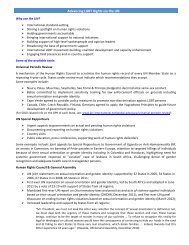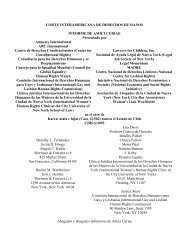Addressing sexual orientation and gender ... - ARC International
Addressing sexual orientation and gender ... - ARC International
Addressing sexual orientation and gender ... - ARC International
Create successful ePaper yourself
Turn your PDF publications into a flip-book with our unique Google optimized e-Paper software.
view of the Special Rapporteur, the identity of an individual is made up of multiplecomponents, including <strong>gender</strong>, age, nationality, profession, <strong>sexual</strong> <strong>orientation</strong>, politicalopinion, religious affiliation <strong>and</strong> social origin; therefore, tolerance, mutual underst<strong>and</strong>ing<strong>and</strong> respect for all, without prejudice, stereotyping or discrimination, should be the basis ofhuman relations of any kind. He urges States to take appropriate measures to address themultiple <strong>and</strong> often interlinked forms of discrimination faced by individuals on the basis oftheir race, colour, descent, national or ethnic origin or <strong>sexual</strong> <strong>orientation</strong>.16. The Special Rapporteur is concerned that the underreporting of racist crimes by victimscontinues to be a problem, including in the case of irregular migrants <strong>and</strong> asylum seekers.Lack of reporting distorts statistics <strong>and</strong> data, <strong>and</strong> may as a result create the impressionthat racist crimes by extremist political parties, movements <strong>and</strong> groups do not exist or areless prevalent than they actually are. Furthermore, lack of reporting <strong>and</strong> of reliable dataremains an important obstacle to address effectively racist, xenophobic <strong>and</strong> intolerantcrimes by individuals closely linked to extremist political parties, movements <strong>and</strong> groups.The Special Rapporteur reiterates again the importance of collecting accurate statistics <strong>and</strong>disaggregated data on racist, xenophobic <strong>and</strong> homophobic crimes. He also encouragesStates <strong>and</strong> civil society actors to establish detailed systems for recording, reporting <strong>and</strong>monitoring all these incidents <strong>and</strong> to encourage victims to report them.III. Good practices in countering extremist political parties, movements <strong>and</strong>groups24. The Special Rapporteur also welcomes measures taken by States with regard to thetraining of their officials, in particular law enforcement agents. He was informed ofprogrammes that include human rights training sessions developed for the police, thejudiciary <strong>and</strong> the Public Prosecutor’s Office. The Special Rapporteur also noted with interestthat some countries had developed specific statistics collection systems that disaggregatedata on hate crimes, including hate crimes committed against individuals on the grounds ofrace, colour, ethnicity, origin or minority status, citizenship, language, religion, disability,<strong>sexual</strong> <strong>orientation</strong>, <strong>gender</strong> or trans<strong>gender</strong>. The Special Rapporteur also noted that, in theabsence of official data in some States, non-governmental organizations play a key role bycollecting statistical data on hate crimes. He welcomes these initiatives, which allow theprevalence of such crimes <strong>and</strong> the impact of legislation on racist <strong>and</strong> xenophobic crimes tobe assessed.IV. Conclusions <strong>and</strong> recommendations31. As stated in the outcome document of the Durban Review Conference, any advocacy ofnational, racial or religious hatred that constitutes incitement to discrimination, hostility orviolence should be prohibited by law, as should be the dissemination of ideas based onracial superiority or hatred, incitement to racial discrimination as well as all acts of violenceor incitement to such acts. In this regard, the Special Rapporteur calls upon all States torespect the commitments made in the Durban documents. He calls upon States parties tothe <strong>International</strong> Convention on the Elimination of All Forms of Racial Discrimination tocomply fully with their obligations as enshrined in article 4 of the Convention. In thisconnection, it is crucial to introduce into domestic criminal law a provision to the effect thatthe commission of an offence with racist, xenophobic, anti-Semitic or homophobicmotivation or aim constitutes an aggravating circumstance attracting heavier sanctions.32. The Special Rapporteur recalls that States have the responsibility of bringing to justicethe perpetrators of crimes with racist, xenophobic, anti-Semitic or homophobic motivation<strong>and</strong> to fight against impunity. Indeed, as stated in paragraph 81 of the Durban Declaration,any form of impunity for crimes motivated by racist <strong>and</strong> xenophobic attitudes plays a rolein weakening the rule of law <strong>and</strong> democracy <strong>and</strong> tends to encourage the recurrence of suchacts. States should therefore ensure prompt, thorough <strong>and</strong> impartial investigation intothese crimes, <strong>and</strong> that those responsible are adequately sanctioned.33. The Special Rapporteur reiterates his recommendation that States should collectdisaggregated data <strong>and</strong> statistics on racist, xenophobic, anti-Semitic <strong>and</strong> homophobic6




